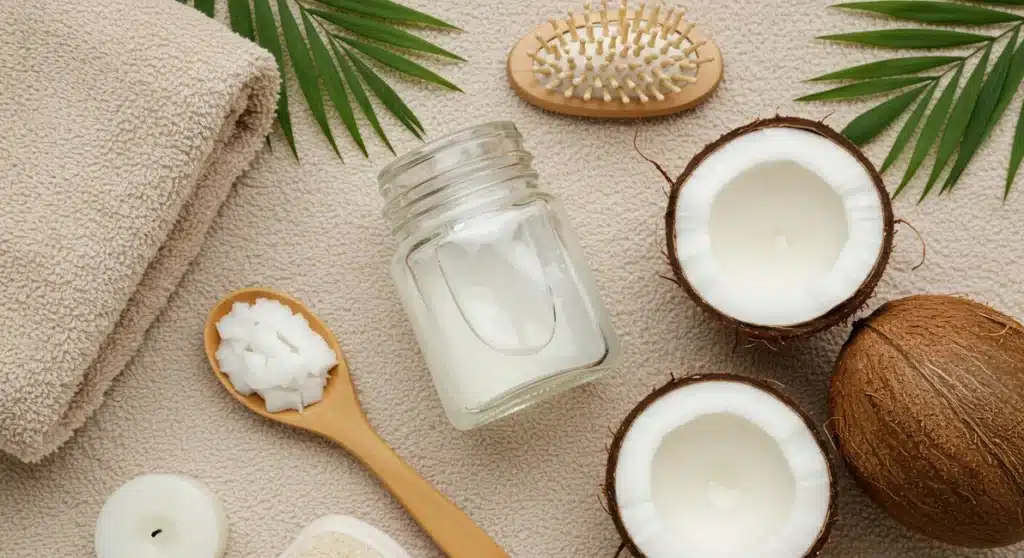Introduction
In recent years, natural hair care solutions have grown in popularity—and coconut oil for hair stands at the forefront of this trend. From ancient Ayurvedic remedies to modern beauty routines, coconut oil has long been a staple for achieving healthier, shinier, and stronger hair.
But what exactly makes coconut oil such a magical ingredient? Can it really help with hair growth, dandruff, and damage? Let’s explore everything you need to know about coconut oil for hair and how to use it the right way.
What Is Coconut Oil?
Coconut oil is extracted from the kernel or meat of mature coconuts harvested from the coconut palm. It is rich in saturated fats, particularly lauric acid, which gives it powerful moisturizing, antimicrobial, and anti-inflammatory properties.
There are various types of coconut oil, including:
-
Virgin Coconut Oil (unrefined, cold-pressed)
-
Refined Coconut Oil (processed and bleached)
-
Fractionated Coconut Oil (liquid form, without long-chain fatty acids)
When it comes to hair care, virgin coconut oil is considered the best due to its purity and nutrient-rich profile.
Why Coconut Oil Is Good for Hair
Coconut oil penetrates the hair shaft more effectively than most other oils. This is due to its low molecular weight and straight-chain structure, which allows it to absorb deeply into the hair, instead of just coating the surface.
It also contains:
-
Lauric acid – antimicrobial and strengthening
-
Capric acid – moisturizing and healing
-
Vitamin E – antioxidant, supports hair health
These components make it ideal for nourishing the scalp, reducing breakage, and adding shine.
Benefits of Coconut Oil for Hair
Promotes Hair Growth
Coconut oil improves blood circulation when massaged into the scalp. This stimulates hair follicles and may promote faster hair growth. It also protects hair strands from breakage, helping retain length.
Reduces Protein Loss
Research shows that coconut oil helps prevent protein loss in both damaged and undamaged hair. This makes it highly effective for those with weak, brittle, or chemically-treated hair.
A 2003 study published in the Journal of Cosmetic Science found that coconut oil was the only oil tested that reduced protein loss from hair.
Deep Conditioning and Moisture
Dry hair can lead to split ends and frizz. Coconut oil acts as a deep conditioner, locking in moisture and restoring softness and elasticity. Just one treatment can make hair feel smoother and more manageable.
Reduces Dandruff
Its antifungal and anti-inflammatory properties make coconut oil effective in combating dandruff and dry, flaky scalp. Regular use helps maintain a healthy scalp environment.
Protects Against Damage
Coconut oil forms a protective barrier against environmental pollutants, sun exposure, and heat styling. It also reduces mechanical damage caused by brushing and styling tools.
How to Use Coconut Oil for Hair
Pre-Wash Treatment
Applying coconut oil before washing your hair can reduce damage caused by shampooing. Here’s how:
-
Warm 1–2 tablespoons of coconut oil.
-
Apply evenly through dry hair.
-
Leave it on for 30 minutes before washing.
Overnight Hair Mask
For deeper conditioning:
-
Apply warm oil from roots to tips.
-
Cover with a shower cap or towel.
-
Leave overnight and shampoo in the morning.
Leave-In Conditioner
Just a small amount of coconut oil can be used post-shower to tame frizz and add shine:
-
Rub a few drops between your palms.
-
Apply lightly to damp ends, avoiding the scalp.
Scalp Massage
For a nourishing scalp treatment:
-
Use fingertips to gently massage oil into the scalp in circular motions.
-
This boosts circulation and can help reduce dryness and dandruff.
Best Types of Coconut Oil for Hair
When shopping for coconut oil, always look for:
-
Virgin or Extra Virgin (unrefined)
-
Cold-Pressed
-
Organic
-
Non-GMO
Recommended brands (external link):
For best results, avoid refined or hydrogenated versions, as they lack the nutrients essential for hair health.
How Often Should You Use Coconut Oil?
The ideal frequency depends on your hair type:
| Hair Type | Frequency |
|---|---|
| Dry or Damaged | 2–3 times/week |
| Oily or Fine Hair | 1 time/week |
| Normal Hair | 1–2 times/week |
Using too much coconut oil too often can make hair greasy and cause buildup. Always start small.
Who Should Avoid Coconut Oil?
While coconut oil benefits most hair types, it might not suit everyone. Avoid or reduce use if you have:
-
Extremely fine hair – may weigh it down
-
Low-porosity hair – might lead to buildup
-
Scalp acne or sensitivity – can clog pores
Always do a patch test before using coconut oil on your scalp or skin.
Coconut Oil Hair Treatment Recipes
Coconut Oil & Honey Mask (Moisture Boost)
-
2 tbsp coconut oil
-
1 tbsp raw honey
-
Mix, apply to damp hair, leave 30 minutes, rinse.
Coconut Oil & Aloe Vera Mask (Soothing Scalp)
-
2 tbsp coconut oil
-
2 tbsp fresh aloe vera gel
-
Blend, apply to scalp, leave 20 minutes, rinse.
Coconut Oil & Castor Oil (Hair Growth Blend)
-
1 tbsp coconut oil
-
1 tbsp castor oil
-
Warm slightly, massage into scalp, leave overnight.
Common Myths About Coconut Oil
❌ Myth: Coconut oil works the same for everyone.
✅ Fact: Hair porosity, texture, and scalp type play a big role in how effective it is.
❌ Myth: More oil = better results.
✅ Fact: Using too much can cause buildup and weigh hair down.
❌ Myth: It cures hair loss.
✅ Fact: While it helps reduce breakage and scalp issues, it doesn’t treat genetic hair loss (like androgenetic alopecia).
Final Thoughts
Coconut oil is a time-tested remedy backed by both tradition and science. Whether you’re dealing with dryness, damage, or dandruff, incorporating this natural oil into your routine can significantly boost your hair’s health and shine.
Remember, the key to success is consistency, correct usage, and using the right type of coconut oil. With a little care and effort, your hair can become softer, stronger, and more vibrant than ever.
FAQs
Q: Can coconut oil help with split ends?
A: Yes, it can temporarily seal split ends and prevent further breakage, but trimming is still necessary.
Q: Should I apply coconut oil to wet or dry hair?
A: For deep treatments, apply to dry hair. For lighter conditioning, use on damp hair.
Q: Is coconut oil safe for colored or chemically treated hair?
A: Yes, but use virgin coconut oil and rinse thoroughly to avoid buildup.
Q: Can I use coconut oil daily?
A: It’s not recommended for daily use unless your hair is extremely dry. Overuse can lead to greasiness.







